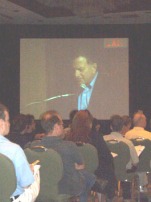Toronto, Canada—The doors to the conference venue opened and delegates started finding their seats, surprised to find a band already revved up onstage, and what looked like African drums on every chair in the cavernous ballroom of the Toronto Hilton.
 “What are we supposed to do with these drums?” Toronto-based journalist Marites Sison and I wondered, as we got settled.
“What are we supposed to do with these drums?” Toronto-based journalist Marites Sison and I wondered, as we got settled.
It didn’t take long for us to find the answer, and it was an exhilarating, invigorating one. For the next 45 minutes or so, we and the hundreds of other journalists who came to Toronto for the conference, found ourselves pounding away at the drums and swaying to the rhythm of the Drum Café, a group that has been working conferences like this, eliciting audience participation in a unique and energizing team building experi ence.
ence.
“It is our job to demonstrate the importance of working as a team, playing to the same beat, listening to each other, and how individual roles/rhythms, large or small, impact the entire organization,” said the Drum Café in the flyers we found in our seats.
And so it was that Drum Café lifted the spirits of the delegates, 550 from 44 countries, who came to take part in the four-day Global Investigative Journalism Conference. Our spirits definitely needed lifting because, as keynote speaker Lowell Bergman, award-winning
journalist and co-founder of the Berkeley-based Center for Investigative Reporting,  pointed out later that opening day, investigative reporters all over the world are finding themselves practicing their profession in spaces that were getting smaller and smaller each day.
pointed out later that opening day, investigative reporters all over the world are finding themselves practicing their profession in spaces that were getting smaller and smaller each day.
Mainstream media organizations were spending less and less on investigative reporting, Bergman said, there was dwindling support from media organizations, “shrinking opportunities to do the kind of investigative reporting” that really made an impact.
What happens is that we see journalism that is shallow, uncritical and unquestioning, the kind of journalism many of us engage in. Bergman cited as an example how shortly after 9/11 the American media reported on the so-called terrorist network training in Lodi, California and efforts to prosecute and deport Pakistanis living there who were suspected of being part of the so-called terrorist network. The report turned out to be false, with a prosecutor himself admitting making a mistake. Bergman did a story on this fiasco for PBS’ public affairs program Frontline.
In television, Bergman said, TV news becomes just another production in the networks, instead of a genuine truth-telling profession. What’s causing this kind of reporting, Bergman said, is that the economic foundation of investigative reporting is in trouble, despite the fact that never before has there been more information available around for journalists.
It was simply a validation of what many us knew or were going through. But being here, finding new lessons in familiar stories and knowing we were all somehow in the same boat kept us in high spirits.
(The topic of Bergman’s address was, “More than five years after 9/11, what is the real threat of Al-Qaeda?” Watch highlights of his keynote address at the Global Investigative Journalism Conference).
Hello
Great book. I just want to say what a fantastic thing you are doing! Good luck!
Bye
Comment by tovorinok — July 5, 2007 @ 8:01 pm |